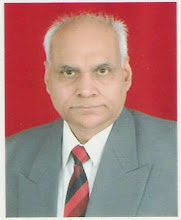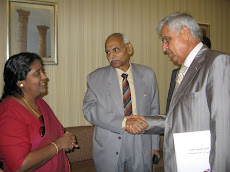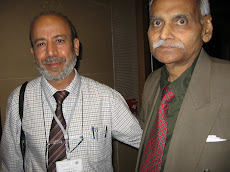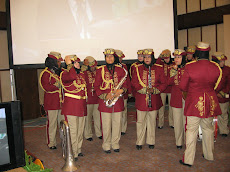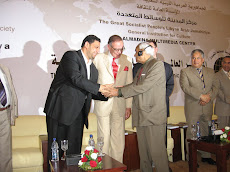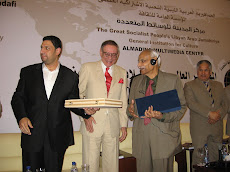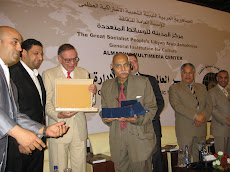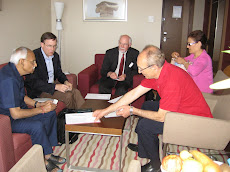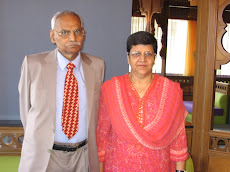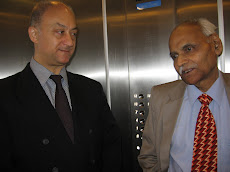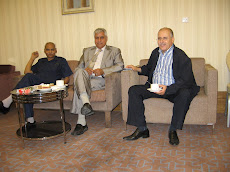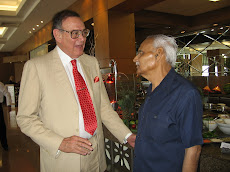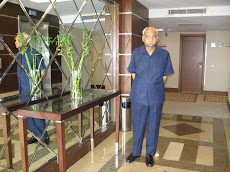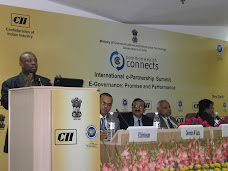INDIAN JOURNAL OF E-GOVERNANCE, Volume I Number 1, January-March 2005
______________________________________________________________________
eGov Website: Request for Proposal - A Portal for District Magistratein India (For the recod)
The District Magistrate, also called District Collector and / orDistrict Officer, holds a key position in India's administrativeset-up. In a laudable attempt, Department of Personnel and Training,Ministry of Personnel, Public Grievances and Pensions, Government ofIndia proposes to set up a portal for the District Magistrate toenable him to have quick access to information and advice. TheDepartment of Personnel and Training invited proposals from theinterested parties. Check the document at
http://persmin.nic.in/otraining/rfp.pdf (accessed: February 24, 2005).
The last date for submission of proposals was February 11, 2005. Thismessage, therefore, is being posted for record only in academic interest.
Dr D.C.Misra
February 24, 2005.
Thursday, February 24, 2005
Wednesday, February 23, 2005
INDIAN JOURNAL OF E-GOVERNANCE, January-March 2005, Volume I Number 1
INDIAN JOURNAL OF E-GOVERNANCE, January-March 2005, Volume I Number 1
______________________________________________________________________
Forthcoming Event: Hawaii International Conference on System Sciences (HICSS-39), January 4-7, 2006, Kauai, Hawaii
This 4-day international event offers the following tracks, including two new tracks on E-Government and Knowledge Management Systems, and a number of “mini-tracks.”
·Collaboration Systems and Technology
·Decision Technologies for Management
·Digital Media: Content and Management
·E-Government
·Information Technology in Health Care
·Internet and the Digital Economy
·Knowledge Management Systems
·Organizational Systems and Technology
·Software Technology
Check them at
http://www.hicss.hawaii.edu/HICSS39/apahome39.htm
Of particular interest to us is the "E-Government" track. Do check it, as it offers a number of very stimulating topics, at
http://www.hicss.hawaii.edu/HICSS39/fegcfp.htm
Dr D.C.Misra
February 23, 2005.
______________________________________________________________________
Forthcoming Event: Hawaii International Conference on System Sciences (HICSS-39), January 4-7, 2006, Kauai, Hawaii
This 4-day international event offers the following tracks, including two new tracks on E-Government and Knowledge Management Systems, and a number of “mini-tracks.”
·Collaboration Systems and Technology
·Decision Technologies for Management
·Digital Media: Content and Management
·E-Government
·Information Technology in Health Care
·Internet and the Digital Economy
·Knowledge Management Systems
·Organizational Systems and Technology
·Software Technology
Check them at
http://www.hicss.hawaii.edu/HICSS39/apahome39.htm
Of particular interest to us is the "E-Government" track. Do check it, as it offers a number of very stimulating topics, at
http://www.hicss.hawaii.edu/HICSS39/fegcfp.htm
Dr D.C.Misra
February 23, 2005.
Tuesday, February 15, 2005
eGov: A Report on a Brainstorming Session on e-Governance on February 14, 2005 at JNU, New Delhi
eGov:
A Report on a Brainstorming Session on e-Governance on February 14, 2005 from 10 a.m. to 2-30 p.m. at the Centre for the Study of Law and Governance (CSLG), Jawaharlal Nehru University (JNU), New Delhi
A REPORT
Theme: e-Governance: Cementing Communities, Dispersing Services
This was a well-attended brainstorming session on e-Governance very competently conceptualized, organized and summed up by Dr Amita Singh, Associate Professor at the Centre. The session was organized along five sub-themes: 1. Problems in urgent need of e-treatment, 2. Perceived solutions, 3. Technology / systems Applications, 4. Democratic imperatives, and 5. Theoretical construction.
1. Problems in urgent need of e-treatment:
Dr Roopmanjari Ghosh of School of Physical Sciences, JNU highlighted some of the unique characteristics of information and communication technologies (ICTs) and spelled out specific areas where ICTs could be utilized.
Prof Alok Bhattacharjee of Bioinformatics Centre, JNU specified a wide variety of fields like genomic, drugs and medicines, hospital administration, tax administration and e-learning where ICTs could be deployed due to availability of new data mining tools and new search methods.
2. Perceived solutions
Dr V.S.Mathur, Director General, Income-Tax, described the various steps taken by his department to computerize the income tax administration, highlighting the service it was providing to tax-payers.
Dr Rajat K. Baisya of Management Department, IIT, Delhi, noted the high percentage of failure of eGov projects and pointed out the lack of bureaucratic commitment to community information center (CIC) project in north-east India.
Dr Norio Kondo, a Japanese visiting scholar, described the Juki-Net, the basic resident register network (RRN) system in Japan serving as a personal authentication system and highlighted laws protecting personal information.
3. Technology / systems Applications
Prof Shatendra Sharma of University Science Instrumentation Centre, JNU, provided an overview of various tools available for utilization in e-governance and highlighted the utilization of e-tools for efficient public service delivery.
Mr Vinnie Mehta of Manufacturers Association for Information Technology (MAIT), New Delhi pointed out to the multiplicity of agencies involved in the implementation of eGov and highlighted inadequate funds with the Ministry of Panchayati Raj for ePanchayats.
Mr Upendra Giri of Project Management Institute (PMI) pointed out to the need of utilization of project management techniques to the e-government projects and highlighted the work done by the PMI.
4. Democratic imperatives
Mr Navin Mandava of Centre for Civil Society (www.ccsindia.org), a New Delhi-based think tank, highlighted the need to enact a ‘dutyto publish” legislation instead of the present Right toInformation Act (RIA), which placed an onus on the citizens to seek information.
Participant’s comments / suggestions
Mr Vikas Kanungo, Chairman and Secretary General, Society for Promotion of e-Governance, New Delhi, sought information about database algorithms in cases of data mining of large databases involved in e-government projects.
The undersigned, an Independent eGov Adviser and Consultant, noted the existence of problems on both sides of hyphen connecting“e” with “Gov,” and highlighted the need to keep the citizen at the centre stage of any eGov project formulation and implementation.
5. Theoretical construction.
Prof Kuldeep Mathur, the Chairperson, concluding the session, observed that “eGov” was just a tool and cannot be asubstitute to “Governance.” eGov will spread in society as a“ripple effect.” Once people got “the taste of blood” (of eGov), change will get institutionalized and get legitimacy.
Summing Up
Summing up the proceedings, Dr Amita Singh observed that we have always been e-governed (by way of using e-tools like telephones, etc.) but many things are required to be done in eGov, particularly in restructuring organizations and knowledge management.
The session ended with a vote of thanks to the chair.
The Centre, particularly Dr Amita Singh, Associate Professor, and its chairperson, Dr Dr Amit Prakash, need to be congratulated for convening the session.
Disclaimer: This is a brief, almost sketchy, record of proceedings which is being posted here for the benefit of those who could not attend the session but may like to know as to what happened in the "brainstorming session" on eGov. For the formal and authoritative proceedings, kindly contact the Centre.
Dr D.C.Misra
February 15, 2005.
A Report on a Brainstorming Session on e-Governance on February 14, 2005 from 10 a.m. to 2-30 p.m. at the Centre for the Study of Law and Governance (CSLG), Jawaharlal Nehru University (JNU), New Delhi
A REPORT
Theme: e-Governance: Cementing Communities, Dispersing Services
This was a well-attended brainstorming session on e-Governance very competently conceptualized, organized and summed up by Dr Amita Singh, Associate Professor at the Centre. The session was organized along five sub-themes: 1. Problems in urgent need of e-treatment, 2. Perceived solutions, 3. Technology / systems Applications, 4. Democratic imperatives, and 5. Theoretical construction.
1. Problems in urgent need of e-treatment:
Dr Roopmanjari Ghosh of School of Physical Sciences, JNU highlighted some of the unique characteristics of information and communication technologies (ICTs) and spelled out specific areas where ICTs could be utilized.
Prof Alok Bhattacharjee of Bioinformatics Centre, JNU specified a wide variety of fields like genomic, drugs and medicines, hospital administration, tax administration and e-learning where ICTs could be deployed due to availability of new data mining tools and new search methods.
2. Perceived solutions
Dr V.S.Mathur, Director General, Income-Tax, described the various steps taken by his department to computerize the income tax administration, highlighting the service it was providing to tax-payers.
Dr Rajat K. Baisya of Management Department, IIT, Delhi, noted the high percentage of failure of eGov projects and pointed out the lack of bureaucratic commitment to community information center (CIC) project in north-east India.
Dr Norio Kondo, a Japanese visiting scholar, described the Juki-Net, the basic resident register network (RRN) system in Japan serving as a personal authentication system and highlighted laws protecting personal information.
3. Technology / systems Applications
Prof Shatendra Sharma of University Science Instrumentation Centre, JNU, provided an overview of various tools available for utilization in e-governance and highlighted the utilization of e-tools for efficient public service delivery.
Mr Vinnie Mehta of Manufacturers Association for Information Technology (MAIT), New Delhi pointed out to the multiplicity of agencies involved in the implementation of eGov and highlighted inadequate funds with the Ministry of Panchayati Raj for ePanchayats.
Mr Upendra Giri of Project Management Institute (PMI) pointed out to the need of utilization of project management techniques to the e-government projects and highlighted the work done by the PMI.
4. Democratic imperatives
Mr Navin Mandava of Centre for Civil Society (www.ccsindia.org), a New Delhi-based think tank, highlighted the need to enact a ‘dutyto publish” legislation instead of the present Right toInformation Act (RIA), which placed an onus on the citizens to seek information.
Participant’s comments / suggestions
Mr Vikas Kanungo, Chairman and Secretary General, Society for Promotion of e-Governance, New Delhi, sought information about database algorithms in cases of data mining of large databases involved in e-government projects.
The undersigned, an Independent eGov Adviser and Consultant, noted the existence of problems on both sides of hyphen connecting“e” with “Gov,” and highlighted the need to keep the citizen at the centre stage of any eGov project formulation and implementation.
5. Theoretical construction.
Prof Kuldeep Mathur, the Chairperson, concluding the session, observed that “eGov” was just a tool and cannot be asubstitute to “Governance.” eGov will spread in society as a“ripple effect.” Once people got “the taste of blood” (of eGov), change will get institutionalized and get legitimacy.
Summing Up
Summing up the proceedings, Dr Amita Singh observed that we have always been e-governed (by way of using e-tools like telephones, etc.) but many things are required to be done in eGov, particularly in restructuring organizations and knowledge management.
The session ended with a vote of thanks to the chair.
The Centre, particularly Dr Amita Singh, Associate Professor, and its chairperson, Dr Dr Amit Prakash, need to be congratulated for convening the session.
Disclaimer: This is a brief, almost sketchy, record of proceedings which is being posted here for the benefit of those who could not attend the session but may like to know as to what happened in the "brainstorming session" on eGov. For the formal and authoritative proceedings, kindly contact the Centre.
Dr D.C.Misra
February 15, 2005.
Saturday, February 12, 2005
Editorial: Task Force on E-Governance: Hyphenating “E” with “Governance”
Editorial:
Task Force on E-Governance: Hyphenating “E” with “Governance:” There are Serious Issues on Both Sides of Hyphen
Ravichandran informs us, and thanks to him as no one else has informed us, that a task force to speed up e-governance in states has been set up by Government of India on February 7, 2005. According to him, “In order to re-engineer the government processes and to develop state-wide solution framework options to enhance the interoperability among state governments, the Department of Administrative Reforms & Pensions and Grievances (DAR&PG) and Department of Information Technology (DIT) together set-up a taskforce for e-governance process engineering and scaleable solutions framework on Monday.”
He further states that: “Leading IT majors, management institutions and consultancy majors like the Indian Institute of Management, Calcutta, (IIM-C); Oracle; Hewlett Packard; PriceWaterhouseCoopers; Intel; Redhat and Liqvid have been selected as the members of the taskforce.”
Ravichandran further informs us that a steering committee too has been set up. In his words: “The steering committee of the taskforce consists of the director of DAR&PG, DIT and one faculty member of IIM-C and one representative from Oracle-HP e-governance Centre of Excellence, according to Oracle.”
The issue is of very considerable importance to us. The issues facing e-governance in India require to be addressed urgently and that too from different perspectives if the potential of e-governance in India is proposed to be realized for the benefit of the citizens. Ravichandran reports:
“In a communication, Oracle said that the taskforce will seek to complete the process re-engineering done by the Centre, state and local governments and also suggest approaches, tools and methodology for re-engineering of government processes. In addition, the taskforce will develop state-wide solution framework tools that enhance interoperability while allowing governments to start encompassing the following:
State-wide government call centre network;
• Kiosk-based delivery of government services or alternative front-end facilitation centres;
• Data-centric view of transactions with citizens seamlessly integrating multiple government agency and stakeholder roles and functions;
• Exploring alternative delivery channels leveraging on wireless and emerging m-governance capabilities; and
• Emergency response and disaster management information system.
According to Oracle, the taskforce will also be responsible for development of a course in cyber law which will address issues of IP, licences, re-purposing, re-use of code and the IT Act 2000. It will also create a digital repository of guidelines for outsourcing and comparative analysis of the various approaches.”
Apparently a tall order has been placed on the task force. Different issues mentioned in the above report not only deserve deliberation but expertise, as there are many “frontier” areas like cyber law where there is no benefit of precedence. Also, the field is fraught with technical issues like inter-operability and open versus proprietary offerings. Moreover, hyphenating “e” with “governance” has serious issues on both sides of the hyphen, that is, within “e” domain as well as in the domain of “governance” which require to be sorted out. Above all, citizen’s perspective needs to be incorporated in the task force. This should not be done by proxy but by providing direct representation of citizens on the task force. After all, e-governance is for the citizens. Is it not?
Dr D.C.Misra
February 11, 2005
______________________________________________________________
*Ravichandran, R., (2005); Taskforce set up to speed up e-governance in states,
The Financial Express, February 8, Tuesday, Net edition, available http://www.financialexpress.com/fe_full_story.php?content_id=81935
(accessed: February 11, 2005) (Dateline: Hyderabad, February 7, 2005)
(Source: http://in.groups.yahoo.com/group/cyberquiz/message/443)
Task Force on E-Governance: Hyphenating “E” with “Governance:” There are Serious Issues on Both Sides of Hyphen
Ravichandran informs us, and thanks to him as no one else has informed us, that a task force to speed up e-governance in states has been set up by Government of India on February 7, 2005. According to him, “In order to re-engineer the government processes and to develop state-wide solution framework options to enhance the interoperability among state governments, the Department of Administrative Reforms & Pensions and Grievances (DAR&PG) and Department of Information Technology (DIT) together set-up a taskforce for e-governance process engineering and scaleable solutions framework on Monday.”
He further states that: “Leading IT majors, management institutions and consultancy majors like the Indian Institute of Management, Calcutta, (IIM-C); Oracle; Hewlett Packard; PriceWaterhouseCoopers; Intel; Redhat and Liqvid have been selected as the members of the taskforce.”
Ravichandran further informs us that a steering committee too has been set up. In his words: “The steering committee of the taskforce consists of the director of DAR&PG, DIT and one faculty member of IIM-C and one representative from Oracle-HP e-governance Centre of Excellence, according to Oracle.”
The issue is of very considerable importance to us. The issues facing e-governance in India require to be addressed urgently and that too from different perspectives if the potential of e-governance in India is proposed to be realized for the benefit of the citizens. Ravichandran reports:
“In a communication, Oracle said that the taskforce will seek to complete the process re-engineering done by the Centre, state and local governments and also suggest approaches, tools and methodology for re-engineering of government processes. In addition, the taskforce will develop state-wide solution framework tools that enhance interoperability while allowing governments to start encompassing the following:
State-wide government call centre network;
• Kiosk-based delivery of government services or alternative front-end facilitation centres;
• Data-centric view of transactions with citizens seamlessly integrating multiple government agency and stakeholder roles and functions;
• Exploring alternative delivery channels leveraging on wireless and emerging m-governance capabilities; and
• Emergency response and disaster management information system.
According to Oracle, the taskforce will also be responsible for development of a course in cyber law which will address issues of IP, licences, re-purposing, re-use of code and the IT Act 2000. It will also create a digital repository of guidelines for outsourcing and comparative analysis of the various approaches.”
Apparently a tall order has been placed on the task force. Different issues mentioned in the above report not only deserve deliberation but expertise, as there are many “frontier” areas like cyber law where there is no benefit of precedence. Also, the field is fraught with technical issues like inter-operability and open versus proprietary offerings. Moreover, hyphenating “e” with “governance” has serious issues on both sides of the hyphen, that is, within “e” domain as well as in the domain of “governance” which require to be sorted out. Above all, citizen’s perspective needs to be incorporated in the task force. This should not be done by proxy but by providing direct representation of citizens on the task force. After all, e-governance is for the citizens. Is it not?
Dr D.C.Misra
February 11, 2005
______________________________________________________________
*Ravichandran, R., (2005); Taskforce set up to speed up e-governance in states,
The Financial Express, February 8, Tuesday, Net edition, available http://www.financialexpress.com/fe_full_story.php?content_id=81935
(accessed: February 11, 2005) (Dateline: Hyderabad, February 7, 2005)
(Source: http://in.groups.yahoo.com/group/cyberquiz/message/443)
Article Review: Bhattacharjee (2005): Reading English August
Article Review-17: Bhattacharjee, Jay (2005): Reading English August: Flatulent Babus Need To Be Accountable, The Times of India, New Delhi, February 11, Friday, p-18, edit page.
_____________________________________________________________________
In response to a civil servant’s call for inculcating “a set of core values,” Bhattacharjee* says that that the Indian civil servants do have a “deeply ingrained set of core values, namely,
self-aggrandisement, turf protection, non-accountability and a quasi-divine right to rule over hapless citizens.” He, therefore suggests safeguards “like accountability, performance monitoring, compensation to linked to efficiency and citizen’s redress against bureaucratic malfunctioning.”
This is a familiar diatribe against the civil servants. The author even challenges some protection civil servants have against anonymous, false or frivolous complaints and many careers are known to have been ruined on this account alone. The suggestions made by the author are also in place. However, the writer is right in saying that the value of “public service” among the civil servants is missing. The question to be asked then is: “What can be done to improve the public service delivery for which the public has a very poor experience, often bordering on harassment? The answer may thus lie in addressing the question of public service delivery and e-government can be one promising way.
Dr D.C.Misra
February 12, 2005.
_____________________________________________________________________
*Bhattacharjee, Jay (2005): Reading English August: Flatulent Babus Need To Be Accountable, The Times of India, New Delhi, February 11, Friday, p-18, edit page,
http://epaperdaily.timesofindia.com/Daily/skins/TOI/navigator.asp? Daily=CAP (accessed: February 12, 2005).
_____________________________________________________________________
In response to a civil servant’s call for inculcating “a set of core values,” Bhattacharjee* says that that the Indian civil servants do have a “deeply ingrained set of core values, namely,
self-aggrandisement, turf protection, non-accountability and a quasi-divine right to rule over hapless citizens.” He, therefore suggests safeguards “like accountability, performance monitoring, compensation to linked to efficiency and citizen’s redress against bureaucratic malfunctioning.”
This is a familiar diatribe against the civil servants. The author even challenges some protection civil servants have against anonymous, false or frivolous complaints and many careers are known to have been ruined on this account alone. The suggestions made by the author are also in place. However, the writer is right in saying that the value of “public service” among the civil servants is missing. The question to be asked then is: “What can be done to improve the public service delivery for which the public has a very poor experience, often bordering on harassment? The answer may thus lie in addressing the question of public service delivery and e-government can be one promising way.
Dr D.C.Misra
February 12, 2005.
_____________________________________________________________________
*Bhattacharjee, Jay (2005): Reading English August: Flatulent Babus Need To Be Accountable, The Times of India, New Delhi, February 11, Friday, p-18, edit page,
http://epaperdaily.timesofindia.com/Daily/skins/TOI/navigator.asp? Daily=CAP (accessed: February 12, 2005).
Thursday, February 10, 2005
Occasional Paper Review: Okot-Uma (2004): Roadmap to eGov Implementation
Occasional Paper Review -17: Okot-Uma, Rogers W'O(2004): The Roadmap to eGovernance Implementation: SelectedPerspectives
As the title of the paper* indicates, it provides selected perspectives on a roadmap to eGovernance suggested by the authorbased on his experiences in the Commonwealth member countries. He lists 4 milestones: (i) Stakeholder Statement of Requirements –the Expectations, (ii) Baseline Assessment: An assessment of the`status quo', of all pertinent `entities' and processes, (iii) Blue Print for eGovernance: An eGovernanceMasterPlan (eGMP) – Aggregation Scenarios, with Strategic Optionsand an Action plan, essentially arising from the discrepancies between the Expectations and the Baseline Assessment, and (iv)Implementation: One mode of approach to eGovernance implementation is its treatment as a combined Project Management Process and a Change Management Process for eGovernance (pp 1-2).
After describing the technical aspects of creating national information infrastructure (NII) within the framework of global information infrastructure (GII), Okat-Uma also presents a taxonomyof levels of evolution of eGovernance and implications for integration of Government services thus: (i) Level 0: Internalising,(ii) Level 1: Informing, (iii) Level 2: Interacting, (iv) Level 3:Transacting, (v) Level 4: Integrating, and (vi) Level 5: Transforming(pp 15-16), finally providing a Blueprint for eGovernance: A National eGovernance Masterplan ( eGMP). The author provides interesting perspectives on eGovernance. It is a useful reading for any one interested in eGovernance.
Dr D.C.Misra
New Delhi, India
February 10, 2005
______________________________________________________________________ *Okot-Uma, Rogers W'O (2004): The Roadmap to eGovernanceImplementation:Selected Perspectives, Presented at a CommonwealthRegional Pacific Workshop on Law and Technology, 1 – 5 November2004, Wellington, New Zealand, 33 pp, available:http://www.rileyis.com/publications/research_papers/guest/Roadmap2eGov.pdf (accessed: February 10, 2005)
(Source: http://in.groups.yahoo.com/group/cyberquiz/message/438)
As the title of the paper* indicates, it provides selected perspectives on a roadmap to eGovernance suggested by the authorbased on his experiences in the Commonwealth member countries. He lists 4 milestones: (i) Stakeholder Statement of Requirements –the Expectations, (ii) Baseline Assessment: An assessment of the`status quo', of all pertinent `entities' and processes, (iii) Blue Print for eGovernance: An eGovernanceMasterPlan (eGMP) – Aggregation Scenarios, with Strategic Optionsand an Action plan, essentially arising from the discrepancies between the Expectations and the Baseline Assessment, and (iv)Implementation: One mode of approach to eGovernance implementation is its treatment as a combined Project Management Process and a Change Management Process for eGovernance (pp 1-2).
After describing the technical aspects of creating national information infrastructure (NII) within the framework of global information infrastructure (GII), Okat-Uma also presents a taxonomyof levels of evolution of eGovernance and implications for integration of Government services thus: (i) Level 0: Internalising,(ii) Level 1: Informing, (iii) Level 2: Interacting, (iv) Level 3:Transacting, (v) Level 4: Integrating, and (vi) Level 5: Transforming(pp 15-16), finally providing a Blueprint for eGovernance: A National eGovernance Masterplan ( eGMP). The author provides interesting perspectives on eGovernance. It is a useful reading for any one interested in eGovernance.
Dr D.C.Misra
New Delhi, India
February 10, 2005
______________________________________________________________________ *Okot-Uma, Rogers W'O (2004): The Roadmap to eGovernanceImplementation:Selected Perspectives, Presented at a CommonwealthRegional Pacific Workshop on Law and Technology, 1 – 5 November2004, Wellington, New Zealand, 33 pp, available:http://www.rileyis.com/publications/research_papers/guest/Roadmap2eGov.pdf (accessed: February 10, 2005)
(Source: http://in.groups.yahoo.com/group/cyberquiz/message/438)
Wednesday, February 09, 2005
Studies Called For on Citizen Grievance Redressal Mechanisms
The Municipal Corporation of Delhi (MCD), which looks after the civic government of the national capital territotory of Delhi (NCTD) in India, covering important aspects of a citizen's life like primaryeducation, public health, sanitation, community services, etc. hasrecently set up an online public grievance redressal system (PGRS) athttp://complaints.mcdonline.gov.in/.
Mukherjee* reports, quoting MCD sources, that 220 people have already registerd their complaints online. This, she says, despite the fact that the corporation is yet to formally launch the system and publicise it among people. According to her the top three grievancesof citizens pertain to 1. Property tax (17 percent), 2. Sanitation(13 percent) and 3. Engineering Department (12.2 percent). Once thePGRS is formally launched and publicised, a large number of grievances are likely to be filed online, some genuine, some not so, some frivolous and some no doubt also making valuable suggestions or providing valuable feedback too.
The Municipal Corporation of Delhi (MCD) must be congratulated for taking this timely initiative in e-governance, particularly in G2C and C2G (government-to-citizens and citizens-to-government) domains where the governance matters most to citizens. The services of theBangalore-based eGovernments Foundation, a non-governmental organisation (NGO), which set up the PGRS free-of-cost also need to be appreciated.
However, important issues arise which desrve closer look. First, how to cope with an avlanche of online grievances with a built-intracking system? Secondly, how to sift the genuine grievances of thecitizens from the frivolous or dilatory grievances? Thirdly, how to set up a grievance redressal system for the citizens who despitepaying heavy taxes do not get any commensurate service from the civic bodies in return? Lastly, which is better from the administrative point of view: online grievance redressal or offline grievanceredressal? Some studies are urgently called for to aid and advise theMCD in this initiative in e-governance which will no doubt prove equally useful to other public-dealing institutions.
Dr D.C.Misra
February 8, 2005.
______________________________________________________________________
*Mukherjee, Anuradha, TNN (2005): Property tax tops MCD onlinegrievance redressal list, The Times of India, New Delhi, February 8,Tuesday, p-4, available (registration required)http://epaperdaily.timesofindia.com/Daily/skins/TOI/navigator.asp?Daily=CAP
Mukherjee* reports, quoting MCD sources, that 220 people have already registerd their complaints online. This, she says, despite the fact that the corporation is yet to formally launch the system and publicise it among people. According to her the top three grievancesof citizens pertain to 1. Property tax (17 percent), 2. Sanitation(13 percent) and 3. Engineering Department (12.2 percent). Once thePGRS is formally launched and publicised, a large number of grievances are likely to be filed online, some genuine, some not so, some frivolous and some no doubt also making valuable suggestions or providing valuable feedback too.
The Municipal Corporation of Delhi (MCD) must be congratulated for taking this timely initiative in e-governance, particularly in G2C and C2G (government-to-citizens and citizens-to-government) domains where the governance matters most to citizens. The services of theBangalore-based eGovernments Foundation, a non-governmental organisation (NGO), which set up the PGRS free-of-cost also need to be appreciated.
However, important issues arise which desrve closer look. First, how to cope with an avlanche of online grievances with a built-intracking system? Secondly, how to sift the genuine grievances of thecitizens from the frivolous or dilatory grievances? Thirdly, how to set up a grievance redressal system for the citizens who despitepaying heavy taxes do not get any commensurate service from the civic bodies in return? Lastly, which is better from the administrative point of view: online grievance redressal or offline grievanceredressal? Some studies are urgently called for to aid and advise theMCD in this initiative in e-governance which will no doubt prove equally useful to other public-dealing institutions.
Dr D.C.Misra
February 8, 2005.
______________________________________________________________________
*Mukherjee, Anuradha, TNN (2005): Property tax tops MCD onlinegrievance redressal list, The Times of India, New Delhi, February 8,Tuesday, p-4, available (registration required)http://epaperdaily.timesofindia.com/Daily/skins/TOI/navigator.asp?Daily=CAP
Saturday, February 05, 2005
Good Morning and Welcome to eGov-India Blog
Good Morning!
And Welcome to eGov-India Blog.
Dr D.C.Misra
New Delhi, India
And Welcome to eGov-India Blog.
Dr D.C.Misra
New Delhi, India
Subscribe to:
Comments (Atom)





